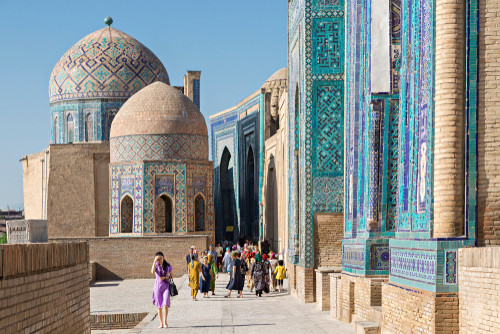PROFILE – Uzbekistan in a hurry to grow its Islamic economy
Uzbekistan has been busy the last two years building its Islamic economy.
The former Soviet state is the most populous country in Central Asia, with the majority of its 32 million people Muslim.
Following the death in 2016 of former president Islam Karimov, who came to power in the communist era and had an iron grip on the country, his successor Shavkat Mirziyoyev vowed to open the economy and attract foreign investments.
Mirziyoyev’s government has certainly succeeded in substantially increasing foreign direct investment. According to the U.N. Conference on Trade and Development (UNCTAD), investment inflows grew four-fold in 2018 to reach $412 million, from $98 million in 2017. Most were Russian multinational corporations focused on oil and gas, but new ones in 2018 also came from China, India, Republic of Korea and Turkey.
In the Islamic economy sectors, Uzbekistan’s focus has been primarily on three fronts: building an Islamic finance ecosystem, making itself accessible to Muslim tourists, and establishing trade links with key Islamic economies.
ISLAMIC FINANCE
In July 2018, the government said it planned to introduce Islamic finance regulations and set up an Islamic finance institution to expand its banking sector and tap foreign markets.
This was by no means the first sign of intent with regards Islamic finance for Uzbekistan but it did come at a time when the expansion of Shariah-compliant financing was accelerating, thanks in large part to the Islamic Corporation for the Development of the Private Sector (ICD), a member of the Islamic Development Bank Group.
As far back as 2006, small- and medium-sized enterprises-focused Ipak Yuli Bank received a $2 million financing line from the ICD. Ipak Yuli went on to receive two other financial lines with the ICD, $5 million in 2010 and $14 million in 2017.
In July 2018, two institutions, Trustbank and Invest Finance Bank, signed lines of financing with the ICD.
A few months later in September, the ICD signed Shariah-compliant financing with six Uzbek financial institutions: Kapitalbank, Asaka Bank, Uzbek Industrial and Construction Bank, Turonbank, Hamkorbank, and Asia Alliance Bank.
Most recently in June this year, Kapitalbank signed an agreement with the ICD that will allow it to seek technical advice from the Saudi body to set up a new Islamic banking window.
In the same month, Trustbank said it would work with the ICD on the new Global Platform for Private Sector that aims to facilitate collaboration on business opportunities.
TOURISM
Uzbekistan’s international visitor numbers grew from 302,400 in 2000 to 1.06 million in 2010 to 2.16 million in 2016, according to the official statistics office.
The World Travel and Tourism Council (WTTC) estimated tourism directly contributed $275.1 million, or 0.9 percent, to the GDP in 2017.
Tourism growth is positive, with the WTTC expecting 4.238 million international arrivals by 2028.
In the Muslim-friendly sector, the Uzbek government has been proactively building the industry and making the country accessible to Muslim visitors.
In February this year it initiated and hosted the first-ever International Forum on Pilgrimage Tourism, which aims to expand international cooperation in the development of the sector and attract more investments.
Uzbekistan has over 7,000 tangible cultural heritage sites from different eras and civilisations, according to UNESCO, and the country's Islamic heritage dates back to the eighth century.
To make visiting the country easier for tourists from Muslim-majority countries, the Tashkent government has made visa-free facilities available for several nations including neighbours Azerbaijan, Tajikistan, Kyrgyzstan, Kazakhstan, and UAE, Brunei, Malaysia, Indonesia and Turkey.
Last year the government initiated a project to develop a special information portal, available in several languages, to provide information on visas, residence permits, registrations and tax mechanisms, according to UNCTAD.
TRADE
Uzbekistan is also putting itself out there with regards doing business with other Islamic economies.
For the first time, it participated in the Malaysia International Halal Showcase (MIHAS), the Southeast Asian nation’s biggest halal trade fair, in April this year.
More significantly, Uzbekistan has been forging close relations with the UAE to boost economic and trade partnerships.
The high-level third session of the Joint Economic Committee between the UAE and Uzbekistan was held in Tashkent in the first quarter of this year, chaired by UAE’s minister of economy and the prime minister of Uzbekistan.
The two countries agreed to increase trade exchange volume and investments in several sectors, including the halal industry, food production, agriculture, finance, and tourism.
Non-oil trade between the two countries was $387 million in 2017.
Uzbekistan’s deputy minister of investment and foreign trade was also on hand to woo Saudi business during April’s Saudi-Uzbek Business Forum in Tashkent.
The country has also been identified by Malaysia’s Halal Industry Development Corporation (HDC) as having “halal opportunities”.
While Malaysia aims to lend its halal expertise to Uzbekistan, the Central Asian state itself could boost its exports of food and beverage products to Organisation of Islamic Cooperation (OIC) countries. Its exports from this sector are currently at very low levels: in 2018, the country exported $4.7 million in products of animal origin, $3 million in live animals, $1.15 million in dairy produce, and a paltry $30,000 in meats, according to data from the ITC Trade Map.
The government has promised more technical and financial support for farmers and agribusiness, having earmarked agriculture as being at the heart of the country’s economic transformation.
At the same time, the government is also pushing foreign investments in the priority agribusiness and food production sectors.
© SalaamGateway.com 2019 All Rights Reserved
